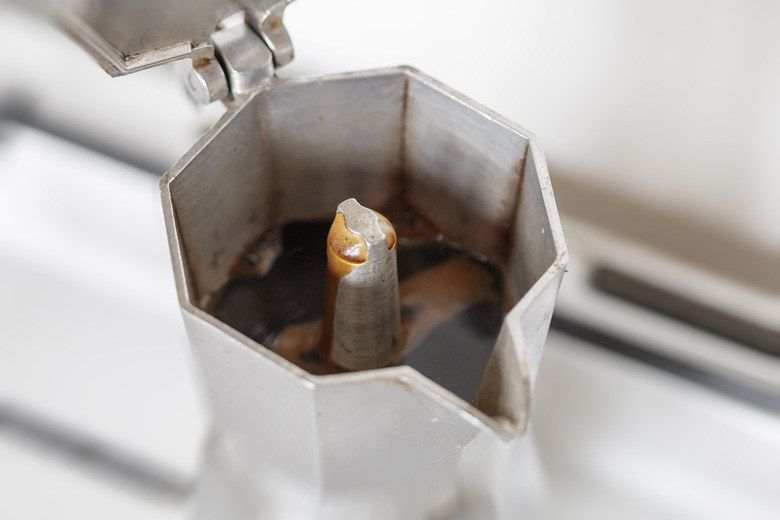Health Risks Of Aluminum Coffee Makers
If you've ever spent time in Europe, you know some things are considered nearly sacred — like the stove top espresso pot. The much-loved Italian "moka pot" is essentially an aluminum coffee pot that uses science-y genius to harness heat and pressure to create deliciously inky, dark, rich espresso-like coffee. It's a staple on every stove in Italy and has been a morning ritual for nearly a century, but is it safe?
The Dangers of Aluminum
The Dangers of Aluminum
There are everyday materials that have slowly been proven dangerous, like anything with lead in it or BPA-based plastics, and, of course, aluminum has been mentioned as being one of these dubious, dangerous products. The trouble is, it's not really accurate. Aluminum isn't the monstrous metal that some health sites might lead you to think it is. In fact, it's the most abundant metal in the earth's crust, and it's in your pop cans, antacids, cosmetics and it's even a food additive, as explained by the Agency for Toxic Substances and Disease Registry.
Aluminum can, in theory, be toxic, but here's the thing — it's seldom toxic to the point of harm when consumed orally. However, you have to work really hard to consume enough aluminum orally to pose a hazard. Sometimes, the amount of aluminum consumed increases because one stores an acidic sauce or drink in an aluminum pot or container, like a drinking bottle. The longer it sits, the greater chance some aluminum leeches out of the metal and pass it on to whoever's consuming it.
That said, even then it's not a big problem unless you're a child. Consuming from an aluminum bottle all day long, with acidic-based drinks like tea and apple juice, could put a regular-sized adult at 86 percent of their weekly intake for aluminum, versus 145 percent for a child weighing 33 pounds, according to a 2017 study published by the Environmental Sciences Europe.
Are Aluminum Percolators Bad for You?
Are Aluminum Percolators Bad for You?
When scientists in Germany completed the above study on the dangers of oral consumption of aluminum, they found that aluminum bottles would be much more inclined to leech into beverages than actually brewing coffee in an aluminum percolator of any kind. Brewing coffee daily in an aluminum pot and consuming 3.17 liters (about 110 ounces) of it weekly will make up only 4 percent of their weekly intake of aluminum. And if making espresso in a moka pot, that's a whole lot of espresso to drink! In fact, you'll get far more aluminum from the antacids you'd have to take to handle all that espresso.
Despite the scaremongering from past studies, the reality is that there's no clear correlation between things like Alzheimer's Disease and aluminum consumption. Those initial findings that caused all the worry have not been replicated in other studies, so it calls their legitimacy into question, especially against more recent findings stating there is no significant concern.
If you're worried about aluminum for whatever reason, you could always try a stainless steel moka pot instead. They're a bit more costly, but they work under the same premise of pressure building and forcing the water up through the percolation funnel and filter basket to create a delicious cup of black gold. The primary difference is that aluminum is a great heat conductor, so it heats up faster. Either way, though, a stove top espresso maker is a must-have for any coffee lover, can be acquired for as little as $20 and will last you almost forever, as reported by Boing Boing.
